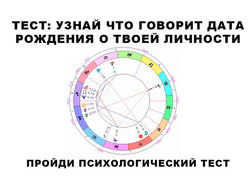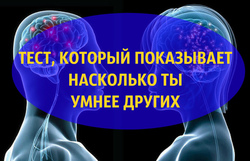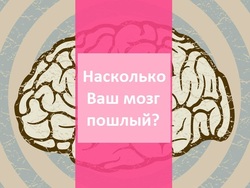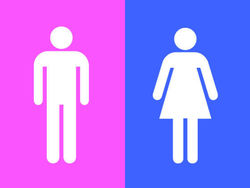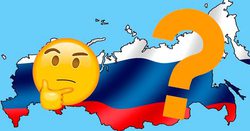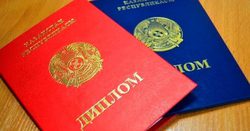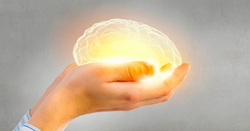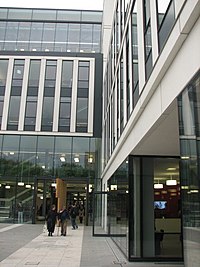ИКТ (ИНФОРМАТИКА)
для подготовки к сессии
Начало теста:
- <
- 1
- 2
- 3
- 4
- 5
- 6
- 7
- 8
- 9
- 10
- 11
- 12
- 13
- 14
- 15
- 16
- 17
- 18
- 19
- 20
- 21
- 22
- 23
- 24
- 25
- 26
- 27
- 28
- 29
- 30
- 31
- 32
- 33
- 34
- 35
- 36
- 37
- 38
- 39
- 40
- 41
- 42
- 43
- 44
- 45
- 46
- 47
- 48
- 49
- 50
- 51
- 52
- 53
- 54
- 55
- 56
- 57
- 58
- 59
- 60
- 61
- 62
- 63
- 64
- 65
- 66
1 *!Which number system is used in PC to create coding of data
Варианты ответов:
- *text
- *binary
- *decimal
- *numerical
- *octal
#2 *!The idea of program control on computing processes for the first time has been stated by
Варианты ответов:
- *Ch. Babbage
- *Ada Lovelace
- *Norbert Wiener
- * John Fon Neumann
- * J. Mauchli
#3 *!Byte is
Варианты ответов:
- * it is the maximum unit of measure of amount of information
- * information unit of quantity represented 1 or 0
- * the tool of changing a letter code in RAM
- * a combination of four hexadecimal figures
- *the sequence from eight bits
#4 *!In computer are stored
Варианты ответов:
- *components
- *algorithms
- *elements
- *data
- *multimedia
#5 *!According to this characteristics, information as a message should include all the relevant information
Варианты ответов:
- *verifiability
- *completeness
- *adequacy
- *accessibility
- *currency
#6 *!According to this characteristics, message must be verifiable so that its validity, accuracy, appropriateness can be assessed
Варианты ответов:
- *currency
- *verifiability
- *completeness
- *accessibility
- *adequacy
#7 *!According to this characteristics, information as a message should be reasonably or legally satisfy a requirement
Варианты ответов:
- *verifiability
- *completeness
- *adequacy
- *accessibility
- *currency
#8 *!According to this characteristics, the information should be timely available and it should not be obsolete as well
Варианты ответов:
- *adequacy
- *verifiability
- *accessibility
- *currency
- *completeness
#9 *!Characteristics of information which striving to reduce or eliminate biases, subjective evaluations by relying on verifiable data
Варианты ответов:
- *adequacy
- *verifiability
- *accessibility
- *objectivity
- *currency
#10 *!Data processing which is used for ordering data
Варианты ответов:
- *sorting of data
- *archiving of data
- *transportation of data
- *filtration of data
- *formalization of data
#11 *!Data processing which is used to compressing data
Варианты ответов:
- *filtration of data
- *archiving of data
- *formalization of data
- *transportation of data
- *sorting of data
#12 *! The maximum number in which no more than 8 bits of information are included
Варианты ответов:
- *4096
- *256
- *512
- *1024
- *2048
#13 *! Binary equivalent of decimal number 42
Варианты ответов:
- *11101001
- *0101011
- *1010101
- *1100111
- *101010
#14 *!Types of magnetic storage
Варианты ответов:
- *firm and soft
- *complex and simple
- *floppy and hard
- *input and output
- *empty and filled
#15 *!For acceleration of access to random access memory it is used
Варианты ответов:
- *semipermanent memory
- *random access memory
- *video memory
- *cash memory
- *additional memory
#16 *!Constant memory of BIOS is used for
Варианты ответов:
- *storage of text data
- *checking of the hard drive volume
- *checking of the computer equipment
- *checking of loading sector
- *initiation of loading of OS
#17 *!He has offered computer organization
Варианты ответов:
- *George Boole
- *John von Neumann
- *N. I. Vavilov
- *Ada Lovelace
- *Norbert Wiener
#18 *!The modem and the fax-modem are used for
Варианты ответов:
- *conversation with users
- *effective work with office equipment
- *exchanging information with other computers
- *connections to satellite communication
- *information output on paper or on computer
#19 *!Core speed
Варианты ответов:
- *information transfer speed
- *microprocessor speed
- *memory size
- *volume of disk memory
- *computer sizes
#20 *!Random Аccess Мemory is
Варианты ответов:
- *cash memory
- *semi permanent memory
- *operative memory
- *video memory
- *the constant memory
#21 *!Hardware is
Варианты ответов:
- *information support
- *hard drive
- *compact disk
- *software
- *computer configuration
#22 *!The streamer is intended for
Варианты ответов:
- *reading of graphic and text information
- *simplification of input of information in the computer
- *output of drawings to paper
- *exchange of information with other computers
- *fast saving of information in the hard drive
#23 *!The central processor serves for
Варианты ответов:
- *visual representation of data
- *calculations and information processing
- *information output
- *input of information
- *storage of information
#24 *!Hard drive is
Варианты ответов:
- *high capacity integral disk
- *zip disk
- *input/output
- *high capacity floopy disk
- *the device of input-output for floopy discs
#25 *!Operative memory is
Варианты ответов:
- *information containing on a hard disk
- *information containing on a floppy disk
- *device which addresses regularly to machine during performance of operations
- *device for direct perception of the information to the person
- *device for long storage of the information on magnetic disks or magnetic tapes
#26 *!Video memory is used for
Варианты ответов:
- *checking of loading sector
- *storage of computer configuration parameters
- *storage of programs which check computer equipment
- *storage of images which are displayed on the screen
- *storage of text data
#27 *!Plotter is used for
Варианты ответов:
- *printing graphs and pictures
- *exchanging information with other computers
- *reading information fro computer
- *quickly saving information located on hard disk
- *printing text
#28 *!In word «INFORMATICS» there are
Варианты ответов:
- *88 bits
- *11 bits
- *44 bits
- *80 bytes
- *88 bytes
#29 *!In word «COMPUTER» there are
Варианты ответов:
- *64 bytes
- *80 bytes
- *10 bytes
- *8 bytes
- *12 bytes
#30 *!In 32 Gbytes there are
Варианты ответов:
- *32000 bytes
- *222 bytes
- *2 20 bytes
- *224 bytes
- *2 35 bytes
#31 *!Convert binary number 1001 into decimal system
Варианты ответов:
- *7
- *1
- *9
- *510
- *8
#32 *!Multiplication of binary numbers 1011 and 110
Варианты ответов:
- *1000000
- *0000100
- *0011100
- *1000010
- *0100000
#33 *!Convert hexadecimal number 255 into decimal system
Варианты ответов:
- *211
- *333
- *531
- *343
- *597
#34 *!Decimal number 2 in binary system is written as
Варианты ответов:
- *1111
- *10
- *11
- *1001
- *01
#35 *!The sum of binary numbers 111011+101010 is equal to
Варианты ответов:
- *1100101
- *0101100
- *0011011
- *1100111
- *0111100
#36 *!The multiplication of binary numbers 110 and 111
Варианты ответов:
- *111000
- *101100
- *101110
- *111100
- *101010
#37 *!Why is mathematical coprocessor necessary
Варианты ответов:
- *permanent storage of the information which is used at work in a computer
- *to help to basic processor in performance of mathematical operations
- *for recording data on cd
- *printing information
- *reading of the information
#39 *!Second generation computers used value technology as
Варианты ответов:
- *transistors
- *integrated circuit chips
- *microcircuits
- *vacuum tubes
- *large scale integration chips
#40 *!Order of switching off of the computer
Варианты ответов:
- *system unit, monitor
- *system unit, printer, monitor
- *printer, system unit
- *monitor, printer, system unit
- *system unit, monitor, printer
#41 *!Logical elements of a computer
Варианты ответов:
- *adder, trigger, counter, coder, decoder
- *hardware and software
- *monitor, printer, scanner, streamer
- *monitor, printer, decoder
- *scanner, streamer, triggers, decoder, adder
#81 *!MS Windows. The Windows Explorer consists of two panels
Варианты ответов:
- *labels, tile
- *table, list
- *list, contents
- *shortcut, table
- *shortcut, labels, list
#82 *!MS Windows. Ways of copying objects
Варианты ответов:
- *horizontal menu, Drag@drop mechanism, context menu
- *horizontal menu, system menu
- *system menu, main menu
- *task panel, my computer, horizontal menu, context menu
- *task area, horizontal menu, main menu
#83 *!MS Windows. The main elements of the window
Варианты ответов:
- *menu bar, tool bar, recycle bin
- *title bar, menu bar, tool bar, work area
- *tool bar, work area, desktop, recycle bin
- *desktop, recycle bin, scroll bar, work area
- *menu bar, tool bar, work area, desktop, recycle bin
#84 *!MS Windows. Admissible operations with file structure
Варианты ответов:
- *creating of scroll bar, re-formatting of files
- *creating of tool bar
- *creating of files, creating of ехе-files
- *creating of folders, creating of shortcuts
- *creating of ехе-files, scanning of files
#85 *!MS Windows. Templates of file names are given via special symbols
Варианты ответов:
- *asterisk and interrogative sign
- *brackets and fractions
- *quotes and asterisks
- *square brackets and equal-signs
- *exclamatory and interrogative signs
#86 *!Loading of MS Word program
Варианты ответов:
- *Office button
- *open the current folder and double click on any label
- *start — programs — MS Office — MS Word
- *context menu — MS Word
- *system menu — MS Word
#87 *!MS Word. Status bar on main window is located
Варианты ответов:
- *on the top part of the window
- *on the bottom part of the document
- *on the tool bar
- *in the dialog box of navigation
- *on the ribbon
#88 *!MS Word. On the tab page layout there are commands, intended for
Варианты ответов:
- *a choice of various modes of viewing of the document
- *spellings, addition of comments and protection of the document
- *creations and changes of a marking of pages of the document
- *inclusions of tables in the text of the document
- *inclusions in the text of references and their editing
#89 *!MS Word. A set of the commands grouped in a certain place of the screen called to
Варианты ответов:
- *group
- *ribbon
- *button
- *tab
- *command
#90 *!MS Word. Header is located
Варианты ответов:
- *in arbitrary order of the page
- *on the bottom (top) side of the page
- *on the desktop
- *on the title bar of the window
- *on status bar
#91 *!MS Word. What kind of underline appears below the word if you type a word that is not in word’s dictionary
Варианты ответов:
- *black
- *red
- *grey
- *blue
- *green
#92 *!MS Word. The ____ bar presents information about the document, the progress of current tasks, and provides controls for viewing the document
Варианты ответов:
- *status
- *menu
- *scroll
- *space
- *control
#93 *!MS Word. The ____ feature in word allows you to type continually without pressing the enter key at the end of each line
Варианты ответов:
- *view
- *overtype
- *wordwrap
- *textwrap
- *click and type
#94 *!MS Word. Transition of the cursor to the beginning of the document
Варианты ответов:
- *PageDown
- *Ctrl+H
- *Print Screen+Alt
- *PageUp
- *Ctrl+Home
#95 *!MS Word. If existing text moves to the right with new text as you type, you are probably in ____ mode
Варианты ответов:
- *moveover
- *overtype
- *insert
- *typeover
- *textwrap
*!MS Word. A saved document is referred to as a ____
Варианты ответов:
- *project
- *word
- *file
- *theme
- *book
#97 *!MS Word. The process of changing the appearance of a paragraph is called paragraph
Варианты ответов:
- *adjusting
- *changing
- *formatting
- *viewing
- *editing
#98 *!MS Word. When your fingers are already on the keyboard, it is sometimes more efficient to use ____ to format text
Варианты ответов:
- *shortcut keys
- *the mouse
- *the formatting toolbar
- *function keys
- *the menu bar
#99 *!MS Word. To find a synonym, click the thesaurus on the ____ tab
Варианты ответов:
- *review
- *dictionary
- *home
- *format
- *thesaurus
#100 *!MS Excel. For construction of schedules and drawing up of formulas it is necessary to use the master
Варианты ответов:
- *diagrams
- *functions
- *forms
- *drawing
- *reports
#101 *!MS Excel. The document created in Excel, is called
Варианты ответов:
- *workbook
- *file
- *document
- *spreadsheet
- *sheet
#102 *!MS Excel. Each worksheet has a sheet name that appears on a(n) ____ at the bottom of the workbook
Варианты ответов:
- *sheet tab
- *status bar
- *active tab
- *name indicator
- *title tab
#103 *!MS Excel. Each worksheet in a workbook has ____ rows
Варианты ответов:
- *1046756
- *100
- *327675
- *1048576
- *65536
#104 *!MS Excel. The ____, located near the top of the excel window, is the control center in excel
Варианты ответов:
- *control bar
- *status bar
- *ribbon
- *mode bar
- *home tab
#105 *!MS Excel. The number of worksheets that you can add to a workbook is
Варианты ответов:
- *1067456
- *65536
- *Limited by the amount of memory on the computer
- *256
- *100
#106 *!MS Excel. The ____ on a worksheet is one in which you can enter data
Варианты ответов:
- *reference cell
- *active cell
- *cell
- *absolute cell
- *home cell
Идет подсчет результатов
11
Сообщить о нарушение
Ваше сообщение отправлено, мы постараемся разобраться в ближайшее время.
Отправить сообщение
5 358 просмотров
Верно 3 / С ошибками 457
- 0
- 0
Популярные тесты
-
Из какой страны вы душой?
HTML-код
Коклягина ПолинаКоличество прохождений: 765 434
1 146 703 просмотров — 05 января 2017
Пройти тест -
Тест на общую эрудицию. Сумеешь набрать хотя бы 10 баллов?
HTML-код
АндрейКоличество прохождений: 449 333
767 500 просмотров — 12 июня 2018
Пройти тест -
Тест на грамотность: Технарь вы или гуманитарий?
HTML-код
АндрейКоличество прохождений: 482 239
738 041 просмотров — 15 января 2019
Пройти тест -
Тест на общие знания, который без ошибок проходят лишь единицы. А получится ли у вас?
HTML-код
АндрейКоличество прохождений: 498 454
799 143 просмотров — 05 марта 2019
Пройти тест -
Тест: Узнайте что говорит дата рождения о вашей Личности
HTML-код
Никитин КонстантинКоличество прохождений: 1 160 537
2 283 859 просмотров — 26 декабря 2016
Пройти тест -
Если вы закончите представленные 15 фраз, то вы настоящий интеллектуал!
HTML-код
АндрейКоличество прохождений: 409 726
773 818 просмотров — 06 марта 2019
Пройти тест -
Тест на знание всего на свете: Осилите его на все 100%?
HTML-код
АндрейКоличество прохождений: 421 732
669 292 просмотров — 15 марта 2019
Пройти тест -
Большой тест на интеллект: узнай свой процент знаний
HTML-код
Всякие Научные ШтукиКоличество прохождений: 777 395
1 116 681 просмотров — 11 февраля 2019
Пройти тест -
Насколько Ваш мозг пошлый?
HTML-код
Никитин КонстантинКоличество прохождений: 978 382
1 846 344 просмотров — 20 декабря 2016
Пройти тест -
Сможем ли мы определить ваш пол, узнав, что вы ненавидите?
HTML-код
Никитин КонстантинКоличество прохождений: 341 230
517 066 просмотров — 20 декабря 2016
Пройти тест -
Тест на общие знания, который на 11/11 осилит лишь настоящий эрудит
HTML-код
АннаКоличество прохождений: 451 708
753 047 просмотров — 30 марта 2020
Пройти тест -
Насколько хорошо вы знаете географию России?
HTML-код
АндрейКоличество прохождений: 343 197
544 598 просмотров — 28 января 2019
Пройти тест -
Всего 2% людей могут назвать ВСЕ столицы этих европейских стран. Часть 2
HTML-код
АндрейКоличество прохождений: 337 594
535 144 просмотров — 30 января 2019
Пройти тест -
А насколько вы умны?
HTML-код
Никитин КонстантинКоличество прохождений: 868 566
1 379 338 просмотров — 20 февраля 2017
Пройти тест -
У вас должно быть как минимум два образования, чтобы пройти этот тест хотя бы на 9/12
HTML-код
АндрейКоличество прохождений: 484 397
935 331 просмотров — 12 февраля 2019
Пройти тест -
Как хорошо вы разбираетесь в географии?
HTML-код
АндрейКоличество прохождений: 372 070
713 132 просмотров — 26 июня 2018
Пройти тест -
Сможете ли вы набрать 10/10 баллов в нашем тесте на общие знания?
HTML-код
АндрейКоличество прохождений: 579 368
885 482 просмотров — 06 марта 2019
Пройти тест -
У вас блестящая эрудиция, если сумеете дать 14 верных ответов из 14
HTML-код
АндрейКоличество прохождений: 557 994
1 131 233 просмотров — 22 ноября 2019
Пройти тест -
Если закончите цитаты из советских фильмов на 14/14, то вы наверняка родились в СССР
HTML-код
АндрейКоличество прохождений: 339 101
534 505 просмотров — 13 марта 2019
Пройти тест -
Тест на сленг СССР, который вы завалите, если не жили в то время
HTML-код
АндрейКоличество прохождений: 324 307
535 678 просмотров — 27 февраля 2019
Пройти тест
HTML-код для вставки на сайт
Разрешить комментарии
Автор теста запретил комментарии
Блок Новинок и Популярных тестов
Теперь тесты из блоков новинок и популярных отображаются внутри вашего сайта, что увеличивает просмотры ваших страниц в 5 раз!
Все комментарии после публикации проходят строгую модерацию!
OK
Home
Expert solutions
Which number system is used in PC to create coding of data
Click the card to flip 👆
Created by
aidanakms
informatics computer technology
Terms in this set (164)
Which number system is used in PC to create coding of data
binary
The idea of program control on computing processes for the first time has been stated by
Ch. Babbage
Byte is
the sequence from eight bits
In computer are stored
data
According to this characteristics, information as a message should include all the relevant information
completeness
According to this characteristics, message must be verifiable so that its validity, accuracy, appropriateness can be assessed
currency
*!According to this characteristics, information as a message should be reasonably or legally satisfy a requirement
*adequacy+
*!According to this characteristics, the information should be timely available and it should not be obsolete as well
*accessibility+
*!Characteristics of information which striving to reduce or eliminate biases, subjective evaluations by relying on verifiable data
*objectivity+
*!Data processing which is used for ordering data
*sorting of data+
Students also viewed
ИКТ
40 terms
zantlesovatomi
Ict
674 termsImages
karinaskk
ict 101-150
50 terms
Bayash3002
икт «все» 1-300
59 terms
diana22345
Other Quizlet sets
advanced pharm-antibiotics
14 terms
jordan_rea7
Intro OOP Chapter 12
13 terms
esther_giles
Contemporary Social Problems Chapter 10
89 terms
Jordan_Johnson581
1
/
2
This article is devoted to the consideration of such issues as the subject and tasks of computer science. Before proceeding to their coverage, let us define the term, the meaning of which should be clearly marked.
The word «informatics» first appeared in Francein the 60s of the last century to designate an area that deals with automated processing of information and uses for this purpose electronic computers. The term was formed by the merger of the other two — «automation» and «information». It means automated processing of information or information automation. This term corresponds to the term «computer science» in English-speaking countries, that is, the science of computer technology.
We offer the reader to preliminarily consider such topics as the subject and tasks of computer science, acquaintance with the history of its emergence.
History of Information Science
We can find the sources of information even in the depthscenturies. The need to express and remember it led many centuries ago to the emergence of speech, counting, writing. Our ancestors tried to invent and further improve the ways of storing information, its processing and distribution. Various evidence of attempts by people of the distant past to preserve it have been found in our days. These are methods such as recordings on clay tablets and birch bark, rock carvings, and then hand-written books.
In the 16th century a printing press appeared. His invention contributed to a significant increase in the ability to store and process the necessary information. The information presented in printed form was the main way of exchange and storage, and continued to remain until the middle of the 20th century. Only with the advent of computers appeared fundamentally new, much more effective ways of storing, collecting, transmitting, processing, the object and tasks of computer science were formulated.
General definition of informatics
You can give a lot of its definitions. This is due to the multifaceted nature of its methods, forms, capabilities and functions. The following definition of the concept of «informatics» is one of the most common.
Informatics is an areahuman activity, which is associated with various processes of information transformation, carried out with the help of computers, as well as with their interaction with the appropriate application environment.
Cybernetics and Informatics
Often there is a confusion of two concepts: «cybernetics» and «informatics». Let’s determine what their similarities are and how they differ from each other.
Cybernetics is the science of some general principlesmanagement, operating in various systems: social, biological, technical, etc. The subject and tasks of computer science are somewhat different. She studies more widely the processes of creating and transforming information, almost without affecting the solution of tasks related to the management of certain objects, as cybernetics does. Its emergence became possible due to the development of computer technology, which is based on it and is inconceivable without it. The development of cybernetics takes place by itself and, although it uses rather actively the achievements of computer technology, does not depend on them at all, as it builds different models of object management.
Informatics in the broad and narrow sense of the word
In the broad sense of the word, computer science is a unityvarious branches of science, production and technology, which are associated with the processing of information. And what about the narrow sense? It can identify 3 interconnected parts of computer science.
1. Informatics as a branch of the national economy
The first of them is the branch of the national economy. In this sense, computer science consists of some homogeneous set of firms that carry out various forms of management, which are engaged in the production of software products, computer equipment and the development of information processing technology. The significance, specificity, goals and tasks of informatics in this sense are determined by the fact that it is to this extent that the growth of labor productivity in various branches of the national economy depends largely on it. A lot of jobs around the world today are equipped with automation tools.
2. Informatics as a fundamental science
As the fundamental science of computer sciencedevelops the methodology of information support for various processes of object management on the basis of computer information systems. One can single out the following leading scientific directions in Europe: medical and economic informatics, computer-integrated production, development of network structure, informatics of environment and social insurance, professional information systems.
Let’s describe the main goals and tasks of computer sciencefundamental. Its goal is to obtain generalized knowledge of various information systems, as well as to identify in their functioning and the construction of general patterns. Its tasks are as follows:
— explore various theories of information systems and technologies;
— Develop a methodology for how to create information support for certain computer systems.
3. Applied aspect
Describing the subject of computer science as an applied science, we note that it deals with:
— the creation of various information communication models that function in a variety of areas of human activity;
— study of regularities that exist in information processes (distribution, processing, accumulation);
— development of technologies and information systemsin specific areas, as well as the development of recommendations relating to their life cycle for different stages (design, production, operation, etc.).
The main tasks of computer science
Its main function is to develop tools and methods for converting information, as well as to use them in organizing various technological processes for its processing.
The following main tasks of computer science can be distinguished:
— research of information processes having any nature;
— solution of engineering and scientific problems of introduction, creation, ensuring the most effective use of computer technology and technology in various areas of public life;
— development of information technology, as well as the creation on the basis of research results of various information processes of the latest information processing technology.
Informatics as a Comprehensive Discipline
It should be said that it does not exist by itselfitself. Informatics is a complex discipline (scientific and technical), which is aimed at creating new information technologies and techniques. They serve to solve problems arising in other areas. In the information society, the complex of its industry is the leading one. In the world there is a tendency to increasing awareness. It depends to a large extent on the progress of this particular area of knowledge, its unity as science, production and technology.
Areas of application of informatics
Informatics today is widely used invarious areas of our lives: in science, production, education and many other areas of activity. The need for costly and complex experiments inevitably arises in connection with the development of modern science. An example is the development of thermonuclear reactors. The role of computer science is to replace real experiments with machines. This saves significant resources, provides the opportunity to process the most modern methods of the results. In addition, these experiments take much less time than real ones. And in some areas of scientific knowledge (for example, in astrophysics) it is simply impossible to carry out a real experiment. Then computer science comes to the rescue. Basically, in these areas, all studies are carried out using model and computational experiments.
The further development of informatics, as well as of any other science, leads to new discoveries and achievements. There are new applications that were previously difficult to even guess.
Communication of informatics with other branches of knowledge
Informatics is a broad field of scientific knowledge that arose at the interface of applied and fundamental disciplines. As a complex scientific discipline, it is associated with the following branches of knowledge:
— with psychology and philosophy (through the theory of knowledge and the doctrine of information);
— with mathematics (through discrete mathematics, the theory of mathematical modeling and algorithms, mathematical logic);
— with linguistics it is connected through the doctrine of sign systems and formal languages;
— with cybernetics, as we have already noted, — through the theory of management and information;
— with radio engineering, electronics, chemistry and physics — through the material part of information systems and the computer.
In the field of view of the science of informatics fallComputational sciences that study the methods and principles of organizing various computing processes, global and local computer networks. On the other hand, it also includes cognitive sciences that are designed to study human efforts in the field of thinking in order to improve the intellectual qualities of computers.
Informatics as a branch of economy
As a branch of the economy, computer science representsa set of economic entities that are designed to serve users (information), the production of processing facilities, as well as the creation of software. There is a tendency to move from an industrial society, where everything is directed to the production and consumption of goods, to the information society.
Today, various informatics tools are widely used in the economy. They are used in practice:
— trade, production and banking management;
— auditing and accounting;
— Budgetary process in municipal and state institutions;
— e-business and e-commerce;
— management of the treasury, auctions and trade exchanges.
Economic informatics is a science thatis designed to form the theory of modeling the activities of various economic entities, municipal, state and regional entities. Its goals are determined by the goals of the economy. That is, they consist in providing economic entities, municipal and state services and organizations with information technologies. What is the subject of informatics economics? It consists in the search for patterns that exist in information modeling, as well as methods for providing knowledge about the economic activities of organizations (enterprises) to an economic and other entity, and the introduction of information technology management in practice.
Methods of modeling and studying economic processes
There are many methods of modeling andstudy of economic processes. They are both specific and general scientific. General scientific: synthesis, analysis, induction, deduction, abstraction, analogy, concretization. All of them reveal regularities existing in stable phenomena or processes. Specific methods are oriented towards information phenomena reflecting economic processes, such as:
— mathematical: deterministic, stochastic, simulation, optimization and network modeling, fuzzy mathematics, mathematical, system, factor, regression and other types of analysis;
— information-logical: graphs and diagrams, graphs, visual and standardized means of representing information flows and business processes.
What is a computer?
Basic concepts of computer science includedifferent computers, since they are the main technical means used to process it. They can be classified according to a number of features: by designation, the principle of operation, the size of the computing power, the methods of organizing the computing process itself, functional capabilities,
Classification of computers by designation
You can divide the computer by its destination into the following 3 groups.
1. General purpose (universal). They are designed to solve various engineering and technical problems: mathematical, economic, information and others, which differ in the large amount of data to be processed, as well as in the complexity of the algorithms. Characteristic features of computer data are their high performance, as well as the variety of data forms to be processed (symbolic, decimal, binary), the variety of operations (special, logical, arithmetic), significant memory capacity, as well as a developed information input-output system .
2. The second group is problem-oriented. Their purpose is to solve a narrower range of tasks, which are usually associated with technological objects, accumulation, registration and processing of small amounts of data.
3. Specialized serve to solve a very narrow range of tasks. This reduces the cost and complexity of such computers, while maintaining reliability and greater productivity.
Information technology
Describing the basic concepts of computer science, you can notsay a few words about information technology. This is a combination of specific software and hardware that serve to perform various operations related to the processing of information in any areas of our lives. Information technology is sometimes called applied computer science or computer technology. This concept arose with the formation of an information society, in which the basis of social dynamics are information, rather than traditional material resources. This is a science, knowledge, intellectual abilities, organizational factors, creativity, initiative, etc. This concept, unfortunately, is so all-encompassing and general that specialists have not yet come to a clear formulation of it. The most successful definition of it was given by Academician Glushkov, who interpreted information technology as a human-machine technology for transferring, processing, collecting information based on the use of various computers. It is developing rapidly and covering more and more types of social activities: management, production, education, science, medicine, financial and banking operations, everyday life, etc.
School Informatics Course
The main task of the school subject «Informatics»is to ensure the conscious and lasting mastery of the students knowledge related to the processes of transformation, receipt, use, storage of information. On this basis, the computer science teacher should also reveal its role in the formation of the scientific picture of the world that has developed in our days, the importance of computer technology and information technology in the development of modern society. The task is also to instill in students the skills of rational and conscious use of computers in educational and professional activities.
The following questions should be covered by the computer science teacher:
— information, various information processes, as well as the languages of its presentation;
— information modeling;
— programming and algorithmization;
— The computer as a means of information processing;
— existing today the new information technology for its processing.
These lines are cross-cutting, that isstudying them occurs at all stages (from 2 to 11 class). Computer science is divided into three levels at school. These levels take into account the age of the students, as well as their preparation.
The first level — the initial (from 2 to 6 class),the second — the basic (from 7 to 9 class), the third — profile (10 and 11 classes). In this case, the program for classes 2 to 9 is the required minimum. In the senior classes, in-depth training in informatics on various profiles is carried out. This provides training for professional activities. The topics that have already been covered are discussed in more detail, different classes of programs are studied.
Informatics: Unified State Exam
In this subject, the USE is one of the longestexams, which lasts about 4 hours. In 2014, the minimum passing grade was 40. Preparation should begin long before the day of testing, and high results in this case will be provided.
The tasks on computer science are divided into blocks independing on their complexity. А1-А13 — questions of a base level with a choice from several variants of the answer. For each correct choice, 1 point is assumed. Tasks on computer science В1-В15 are already tasks of increased complexity. Numbers or the last digits serve as a response to them. The most difficult tasks in informatics are C1-C4. It is necessary to give the fullest possible answer to them.
In each version of the USE, computer science tasks are related in one way or another. However, when solving tasks from category C, it is forbidden to use the calculator and the PC.
</ p>>
From Wikipedia, the free encyclopedia
Informatics is the study of computational systems.[1][2] According to the ACM Europe Council and Informatics Europe, informatics is synonymous with computer science and computing as a profession,[3] in which the central notion is transformation of information.[1][4] In other countries, the term «informatics» is used with a different meaning in the context of library science, in which case it is synonymous with data storage and retrieval.[5]
Different meanings[edit]
In some countries, depending on local interpretations, the term «informatics» is used synonymously to mean information systems, information science, information theory, information engineering, information technology, information processing, or other theoretical or practical fields. In Germany, the term informatics almost exactly corresponds to modern computer science. Accordingly, universities in continental Europe usually translate «informatics» as computer science, or sometimes information and computer science, although technical universities may translate it as computer science & engineering.[6][7]
In the United States, however, the term informatics is mostly used in context of data science, library science[5] or its applications in healthcare (health informatics),[8][9] where it first appeared in the US.
The University of Washington uses this term to refer to social computing.[10] In some countries, this term is associated with natural computation and neural computation.[1][11]
The Government of Canada uses the term to refer to operational units offering network and computer services to the various departments.[12]
Etymology[edit]
In 1956, the German informatician Karl Steinbuch and engineer Helmut Gröttrup coined the word Informatik when they developed the Informatik-Anlage[13] for the Quelle mail-order management, one of the earliest commercial applications of data processing. In April 1957, Steinbuch published a paper called Informatik: Automatische Informationsverarbeitung («Informatics: Automatic Information Processing»).[14] The morphology—informat-ion + —ics—uses «the accepted form for names of sciences, as conics, mathematics, linguistics, optics, or matters of practice, as economics, politics, tactics»,[15] and so, linguistically, the meaning extends easily to encompass both the science of information and the practice of information processing. The German word Informatik is usually translated to English as[16] computer science by universities or computer science & engineering by technical universities (German equivalents for institutes of technology). Depending on the context, informatics is also translated into computing, scientific computing or information and computer technology. The French term informatique was coined in 1962 by Philippe Dreyfus.[17] In the same month was also proposed independently by Walter F. Bauer (1924–2015) and associates who co-founded software company Informatics Inc. The term for the new discipline quickly spread throughout Europe, but it did not catch on in the United States. Over the years, many different definitions of informatics have been developed, most of them claim that the essence of informatics is one of these concepts: information processing, algorithms, computation, information, algorithmic processes, computational processes or computational systems.[18][1]
The earliest uses of the term informatics in the United States was during the 1950s with the beginning of computer use in healthcare.[19] Early practitioners interested in the field soon learned that there were no formal education programs, and none emerged until the late 1960s. They introduced the term informatics only in the context of archival science, which is only a small part of informatics. Professional development, therefore, played a significant role in the development of health informatics.[19] According to Imhoff et al., 2001, healthcare informatics is not only the application of computer technology to problems in healthcare, but covers all aspects of generation, handling, communication, storage, retrieval, management, analysis, discovery, and synthesis of data information and knowledge in the entire scope of healthcare. Furthermore, they stated that the primary goal of health informatics can be distinguished as follows: To provide solutions for problems related to data, information, and knowledge processing. To study general principles of processing data information and knowledge in medicine and healthcare.[20][21] The term health informatics quickly spread throughout the United States in various forms such as nursing informatics, public health informatics or medical informatics. Analogous terms were later introduced for use of computers in various fields, such as business informatics, forest informatics, legal informatics etc. These fields still mainly use term informatics in context of library science.
Informatics as library science[edit]
In the fields of geoinformatics or irrigation informatics, the term -informatics usually mean information science, in context related to library science. This was the first meaning of informatics introduced in Russia in 1966 by A.I. Mikhailov, R.S. Gilyarevskii, and A.I. Chernyi, which referred to a scientific discipline that studies the structure and properties of scientific information.[22] In this context, the term was also used by the International Neuroinformatics Coordinating Facility. Some scientists use this term, however, to refer to the science of information processing, not data management.[23]
In the English-speaking world, the term informatics was first widely used in the compound medical informatics, taken to include «the cognitive, information processing, and communication tasks of medical practice, education, and research, including information science and the technology to support these tasks».[24] Many such compounds are now in use; they can be viewed as different areas of «applied informatics«.
Informatics as information processing science[edit]
In the early 1990s, K.K. Kolin proposed an interpretation of informatics as a fundamental science that studies information processes in nature, society, and technical systems.[22]
A broad interpretation of informatics, as «the study of the structure, algorithms, behaviour, and interactions of natural and artificial computational systems,» was introduced by the University of Edinburgh in 1994. This has led to the merger of the institutes of computer science, artificial intelligence and cognitive science into a single School of Informatics in 2002.[25]
More than a dozen nearby universities joined Scottish Informatics and Computer Science Alliance. Some non-European universities have also adopted this definition (e.g. Kyoto University School of Informatics).
In 2003, Yingxu Wang popularized term cognitive informatics, described as follows:[26]
Supplementary to matter and energy, information is the third essence for modeling the world. Cognitive informatics focuses on internal information processing mechanisms and the natural intelligence of the brain.
Informatics as a fundamental science of information in natural and artificial systems was proposed again in Russia in 2006.[27]
In 2007, the influential book Decoding the Universe was published.
Former president of Association for Computing Machinery, Peter Denning wrote in 2007:[28]
The old definition of computer science — the study of phenomena surrounding computers — is now obsolete. Computing is the study of natural and artificial information processes.
The 2008 Research Assessment Exercise, of the UK Funding Councils, includes a new, Computer Science and Informatics, unit of assessment (UoA),[29] whose scope is described as follows:
- The UoA includes the study of methods for acquiring, storing, processing, communicating and reasoning about information, and the role of interactivity in natural and artificial systems, through the implementation, organisation and use of computer hardware, software and other resources. The subjects are characterised by the rigorous application of analysis, experimentation and design.
In 2008, the construction of the Informatics Forum was completed. In 2018, the MIT Schwarzman College of Computing was established. Its construction is planned to be completed in 2021.
Controversial fields[edit]
- evolutionary informatics — a new field that comes from the concept of an intelligent design. According to Evolutionary Informatics Lab, evolutionary informatics studies how evolving systems incorporate, transform, and export information.[30] In 2017, the influential book «Introduction To Evolutionary Informatics» was published.[31]
Informatics as computer science[edit]
| United States | Germany | Russia | France | Italy | English transcription |
|---|---|---|---|---|---|
| Computer Science, Computing | Informatik | информатика (Latinized: informatika) | Informatique | Informatica | Informatics |
| Theoretical Computer Science | Theoretische Informatik | компьютерная наука | Informatique théorique | Informatica teorica | Theoretical Informatics |
| Computer Engineering | Technische Informatik | компьютерная инженерия | Ingénierie or génie informatique | Ingegneria informatica | Technical Informatics |
| Neurocomputing, Neural computation | Neuroinformatik | нейроинформатика | Neuro-informatique | Neuroinformatica | Neuroinformatics |
[edit]
Computer scientists study computational processes and systems. Computing Research Repository (CoRR) classification distinguishes the following main topics in computer science (alphabetic order):[32][33][34]
- artificial intelligence
- computation and language
- computational complexity
- computational engineering, finance, and science
- computational geometry
- computational game theory
- computer vision and pattern recognition
- computers and society
- cryptography and security
- data structures and algorithms
- databases and digital libraries
- distributed, parallel and cluster computing
- emerging technologies
- formal languages and automata theory
- general literature
- graphics
- hardware architecture
- human-computer Interaction
- information retrieval
- information theory
- logic in computer science
- machine learning
- mathematical software
- multiagent systems
- multimedia
- networking and internet architecture
- neural computing and evolutionary computing
- numerical analysis
- operating systems
- other computer science
- performance
- programming languages
- robotics
- social and information networks
- software engineering
- sound
- symbolic computation
- systems and control
Journals and conferences[edit]
- Information and Computation
- Acta Informatica
- Information Processing Letters
- Neural Information Processing Systems
- Journal of Automata, Languages and Combinatorics
- International Journal of Cognitive Informatics and Natural Intelligence[35]
- Conference on Computer Vision and Pattern Recognition[36])
- Symposium on Theory of Computing
- European Conference on Computer Vision
- Brain Informatics[37]
- International Conference on Computer Vision
- International Conference on Machine Learning
- Algorithmica
- Symposium on Foundations of Computer Science[38])
- European Symposium on Algorithms
- Fundamenta Informaticae
- Symposium on Discrete Algorithms
- Journal of Logic and Computation
- Bioinformatics
- Neural Computing and Applications[39]
- Autonomous Agents and Multi-Agent Systems[40]
- International Symposium on Fundamentals of Computation Theory
- International Colloquium on Automata, Languages and Programming
- Journal of Scientific Computing[41]
- Annual IEEE Symposium on Foundations of Computer Science
- Annual Symposium on Computational Geometry
- Simulation & Gaming[42]
- Journal of Machine Learning Research
- Journal of Artificial Intelligence Research
- ACM Transactions on Graphics
- IEEE Transactions on Visualization and Computer Graphics
- IEEE Transactions on Computers
- IEEE/ACM International Symposium on Microarchitecture
- ACM Symposium on Computer and Communications Security[43]
- Symposium on Parallelism in Algorithms and Architectures
- Symposium on Foundations of Computer Science
[edit]
[edit]
- Informatics Europe
- Association for Computing Machinery
- IEEE Computer Society
- Scottish Informatics and Computer Science Alliance
- Computing Research Association
- Association for the Advancement of Artificial Intelligence
- American Society for Information Science and Technology
- International Federation for Information Processing
- Association for Logic, Language and Information
- Gesellschaft für Informatik
- Association for Women in Computing
- Computer Science Teachers Association
- Computability in Europe
- European Association for Theoretical Computer Science
- Raspberry Pi Foundation
Academic schools and departments[edit]
- Information School at University of Washington[44]
- College of Emergency Preparedness, Homeland Security and Cybersecurity at University at Albany, SUNY[45]
- Department of Informatics at University of California, Irvine[46][47][48]
- College of Literature, Science, and the Arts at University of Michigan[49]
- School of Information at The University of Texas at Austin[50]
- Manning College of Information & Computer Sciences at University of Massachusetts Amherst[51]
- Texas Women’s University[52]
- College of Literature, Science, and the Arts at University of Michigan[49]
- Department of Informatics at Indiana University Bloomington[53][54]
- School of Informatics and Computing at Indiana University–Purdue University Indianapolis[55]
- School of Information at San Jose State University[56]
- School of Computing and Informatics at University of Louisiana at Lafayette[57]
- Department of Computer Science at The University of Iowa[58][59]
- Ira A. Fulton Schools of Engineering at Arizona State University[60]
- School of Informatics, Computing, and Cyber Systems at Northern Arizona University[61][62]
- School of Engineering and Computer Science at Baylor University[63]
- College of Information Sciences and Technology at Pennsylvania State University[64][65]
- College of Engineering and Computing at University of South Carolina[66]
- Doctoral School of Informatics at University of Debrecen[67]
- School of Information Sciences at University of Illinois Urbana-Champaign[68]
- University of Sussex[69]
- Institute for Data Science & Informatics at University of Missouri[70]
- Norwegian University of Science and Technology[71]
- Department of Informatics at University of Bergen[72]
- School of Informatics at University of Edinburgh[73]
- Department of Informatics at Technical University of Munich[74]
- Università della Svizzera italiana[75]
- List of Information Schools
See also[edit]
- Information science
- Behavior informatics
- Computational theory of mind
- Models of neural computation
- Cellular automaton
- Computer simulation
- Computational circuit
- Entscheidungsproblem
- Swarm intelligence
- Biomimetics
- Information processing
- Robotics
- Algorithmics
- Neural computation
- Real-time computing
- Computer architecture
- Artificial intelligence
- Machine learning
References[edit]
- ^ a b c d «What is Informatics? University of Edinburgh» (PDF).
- ^ «INFORMATICS | Bedeutung im Cambridge Englisch Wörterbuch». dictionary.cambridge.org (in German).
- ^ «Are We All In The Same Boat? ACM & Informatics Europe» (PDF).
- ^ «What is Informatics? — Definition from Techopedia». Techopedia.com.
- ^ a b Wellisch, Hans (1972-07-01). «From Information Science to Informatics: a terminological investigation». Journal of Librarianship. 4 (3): 157–187. doi:10.1177/096100067200400302. ISSN 0022-2232. S2CID 62708018.
- ^ «Computer Science and Computer Engineering | Hochschule Osnabrück». www.hs-osnabrueck.de. Retrieved 2020-08-31.
- ^ «Informatik – Technische Informatik (B.Sc.) | Hochschule Osnabrück». www.hs-osnabrueck.de. Retrieved 2020-08-31.
- ^ «What is Informatics? USF Health». www.usfhealthonline.com. 16 February 2017. Retrieved 2020-08-20.
- ^ «Informatics Major». ischool.uw.edu. Retrieved 2020-08-20.
- ^ «Informatics Major». ischool.uw.edu.
- ^ «Forschungszentrum Jülich — Cognitive Neuroinformatics». www.fz-juelich.de. Retrieved 2020-08-22.
- ^ «Informatics [100 records] — TERMIUM Plus® — Search — TERMIUM Plus®». 8 October 2009.
- ^ Biener, Klaus (December 1997). «Karl Steinbuch – Informatiker der ersten Stunde Hommage zu seinem 80. Geburtstag» (PDF) (in German). Retrieved 2021-10-08.
Steinbuch coined this expression together with Helmut Gröttrup, an employee from Peenemünde.
- ^ «Karl Steinbuch Eulogy – Bernard Widrow, Reiner Hartenstein, Robert Hecht-Nielsen» (PDF). uni-kl.de. Archived from the original (PDF) on 2011-07-19. Retrieved 2014-04-28.
- ^ Oxford English Dictionary 1989
- ^ CTKlein. «Best word for «computer science»«. German Language Stack Exchange. Stack Exchange Inc. Retrieved 6 April 2020.
- ^ Dreyfus, Phillipe. L’informatique. Gestion, Paris, June 1962, pp. 240–41
- ^ Wegner, Peter. «Research paradigms in Computer Science, Brown University» (PDF).
- ^ a b Nelson, Ramona; Staggers, Nancy (8 December 2016). Health Informatics: An Interprofessional Approach. Elsevier Health Sciences. p. 7. ISBN 978-0-323-40225-5.
- ^ Imhoff, M., Webb. A,.&Goldschmidt, A., (2001). Health Informatics. Intensive Care Med, 27: 179-186. doi:10.1007//s001340000747.
- ^ Nelson, R. & Staggers, N. Health Informatics: An Interprofessional Approach. St. Louis: Mosby, 2013. Print. (p.4,7)
- ^ a b Yatsko, Viatcheslav A. (2018). «Informatics, Information Science, and Computer Science». Scientific and Technical Information Processing.
- ^ Wang, Yingxu (2013). «Basic theories for neuroinformatics and neurocomputing». 2013 IEEE 12th International Conference on Cognitive Informatics and Cognitive Computing: 3–4. doi:10.1109/ICCI-CC.2013.6622217. ISBN 978-1-4799-0783-0. S2CID 12488667.
- ^ Greenes, R.A. and Shortliffe, E.H. (1990) «Medical Informatics: An emerging discipline with academic and institutional perspectives.» Journal of the American Medical Association, 263(8) pp. 1114–20.
- ^ Brown, Neil. «The old www.cogsci.ed.ac.uk server». www.inf.ed.ac.uk.
- ^ Wang, Yingxu (2003-08-01). «On Cognitive Informatics». Brain and Mind. 4 (2): 151–167. doi:10.1023/A:1025401527570. ISSN 1573-3300. S2CID 61495426.
- ^ «Becoming of informatics as fundamental science and the complex scientific problem». www.mathnet.ru.
- ^ Denning, Peter J. «Computing Is a Natural Science». Communications of the ACM.
- ^ «UoA 23 Computer Science and Informatics, Panel working methods» (PDF). rae.ac.uk. Archived from the original (PDF) on 2016-03-03. Retrieved 2007-09-17.
- ^ «The Evolutionary Informatics Lab – The Evolutionary Informatics Lab».
- ^ Robert J. Marks II (12 June 2017). «Top Ten Questions and Objections to Introduction to Evolutionary Informatics».
- ^ «arXiv.org e-Print archive». arxiv.org.
- ^ «Informatics as a Fundamental Discipline for the 21st Century». Informatics Europe. 2019.
- ^ Denning, Peter J.; Rosenbloom, Paul (2009). The Profession of IT Computing: The Fourth Great Domain of Science. Association for Computing Machinery. OCLC 981466101.
- ^ «International Journal of Cognitive Informatics and Natural Intelligence (IJCINI)».
- ^ IEEE CS (1983). IEEE computer society conference on computer vision and pattern recognition, CVPR. 1983 conf., Washington, D.C. Proceedings: Computer vision and pattern recognition. New York, N.Y. ISBN 978-0-8186-0053-1. OCLC 472099962.
- ^ «Brain Informatics». Brain Informatics.
- ^ «Alvy Ray Smith synapse FOCS Cover». alvyray.com.
- ^ «Neural Computing and Applications». Springer.
- ^ «Autonomous Agents and Multi-Agent Systems». Springer.
- ^ «Journal of Scientific Computing». www.scimagojr.com.
- ^ «Simulation & Gaming». SAGE Journals.
- ^ «ACM CCS 2020 — November 9-13, 2020». www.sigsac.org.
- ^ «University of Washington, BS Informatics».
- ^ «University at Albany, BS Informatics».
- ^ «UC Irvine, B.S. Informatics».
- ^ «UC Irvine, M.S. Informatics».
- ^ «UC Irvine, Ph.D. Informatics».
- ^ a b «University of Michigan, Major in Informatics».
- ^ «University of Texas at Austin, Bachelor’s Degree in Informatics».
- ^ «University of Massachusetts Amherst, BS in Informatics». 22 September 2014.
- ^ «Texas Women’s University, Informatics Bachelor of Science Degrees».
- ^ «Indiana University Bloomington, BS in Informatics».
- ^ «Indiana University Bloomington, Ph.D. in Informatics».
- ^ «IUPUI, BS in Informatics».
- ^ «San Jose State University, Master of Science in Informatics».
- ^ «University of Louisiana at Lafayette, Master of Science in Informatics». 22 May 2017.
- ^ «The University of Iowa, BS in Informatics».
- ^ «The University of Iowa, Informatics, Ph.D.»
- ^ «Arizona State University, Informatics (BS)».
- ^ «Northern Arizona University, Informatics, Master of Science».
- ^ «Northern Arizona University, Informatics, Bachelor of Science».
- ^ «Baylor University, Bachelor of Science in Informatics». 19 July 2022.
- ^ «Penn State College of IST, M.S. in Informatics».
- ^ «Penn State College of IST, Ph.D. in Informatics».
- ^ «University of South Carolina, Informatics, Ph.D.»
- ^ «University of Debrecen, Informatics, PhD».
- ^ «University of Illinois Urbana-Champaign, Informatics PhD».
- ^ «University of Sussex, Informatics PhD».
- ^ «University of Missouri, PhD in Informatics».
- ^ «Norwegian University of Science and Technology, Master of Science in Informatics».
- ^ «University of Bergen, PhD in informatics».
- ^ «University of Edinburgh, MInf Informatics».
- ^ «Technical University of Munich, M.Sc. Informatics».
- ^ «Università della Svizzera italiana, Master in Informatics».
Further reading[edit]
- Informatics Europe (2018). Informatics for All The Strategy (PDF).
- School of Informatics (1994). «What is Informatics?» (PDF).
- Informatics Europe (2018). Informatics Education in Europe: Institutions, Degrees, Students, Positions, Salaries in 2013-2018 (PDF).
- Informatics Europe & ACM Europe Working Group (2013). «Informatics Education: Europe cannot Afford to Miss the Boat» (PDF).
- The Committee on European Computing Education (2018). «Informatics Education in Europe: Are We All In The Same Boat?» (PDF).
- University of Edinburgh (2002). Entry for informatics to appear in International Encyclopedia of Information and Library Science (PDF).
- Informatics Europe (2013). Informatics Doctorates in Europe — Some Facts and Figures (PDF).
- Informatics Europe (2018). Informatics research evaluation (PDF).
Question added by Nabil Aqil
, مدير تنفيذي CEO وفعاليات , قواعد التنمية
Date Posted: 2014/09/14
- 12 Answers
by
Rizwan Ahmad
, Accountant , Bir Al Sabia Technologies Pvt. Ltd.
8 years ago
It is a process of retrieving & storing of data.
Informatics is the science of information. As an academic field it involves the practice of information processing and the engineering of information systems. It studies the structure, algorithms, behaviour, and interactions of natural and artificial systems which store, process, access, and communicate information. The field considers the interaction between humans and information systems alongside the construction of computer interfaces. It also develops its own conceptual and theoretical foundations and utilizes foundations developed in other fields. As such, the field of informatics has great breadth and encompasses many individual specialisations including the more particular discipline of computing science.
by
Shahan Khan
, Officer GSP , WWF-Pakistan (Corporate Relations)
8 years ago
- In the most easiest words it can be defined as the collection, classification, storage, retrieval, and dissemination of recorded knowledge.
by
Nabil Aqil
, مدير تنفيذي CEO وفعاليات , قواعد التنمية
8 years ago
Based on the answers, what are the sources of electronic Informatics?
by
Vinod Jetley
, Assistant General Manager , State Bank of India
8 years ago
the science of processing data for storage and retrieval
agreed with mr.rizwan ,,, good day
“the study and application of information technology to the arts, science and professions, and to its use in organizations and society at large.”
It is is a new and rapidly developing field. It uses computing to solve the big problems: privacy, security, healthcare, education, poverty, and challenges in our environment. All Informatics applications are computer-based.
Business informatics (BI) or organizational informatics is a discipline combining information technology (IT), in formatics and management concepts.
by
Ammar Hafez
, Consultant , Self Employed
8 years ago
As we live in the informatics era, the revolution of telecoms and information systems.. Informatic system is to update and retrieve the your comprehensive data any-time and any-where as long as you needed this information.
by
amer jayyousi
, Business Development Consultant , freelance
8 years ago
- Informatics is the science of information and processing such information and it’s systems.
by
Zafar M. Khan
, Regional Manager Sales & BD — South , Cretesol Pvt. Limited
8 years ago
The word INFORMATICS is practically a combination of2 broad concepts: INFORMATION and TECTICS.
Most of the people ‘mix-up’ DATA with INFORMATION which is not correct. Data is transformed in to information to become usefull. E.g.: ‘2000 tons of cement’ is a raw data, whereas ‘2000 tons of cement sold in a market of20000 tons’ is informatiin coz it reveals the10% market share.
Now, bringing Information should be SMART and TECTICAL with lowest input cost and highest output value.
Therefore, the better the Tectical approach of bringing/converting Information, the higher the required goal achievement ratio ir potential.
Hence the Tectics of bringing Information (useful) is termed as INFORMATICS.
Popular Searches
More Questions Like This
-
What is your favorite Zig Ziglar quote?Top Answer:
You can get everything in life you want if you will just help enough other people get what they want. See MoreAnswers (5)
-
«In the age of information, ignorance is a choice.» Do you agree with this quote and how it applies to your work as an internal auditor?Top Answer:
i think ignorance is a think or mind level. it is controulable. See MoreAnswers (24)
-
What do you say about the quote «Quality is Free, Use it»?Top Answer:
Dear Friends
Thank you for your good responses. Majority of us feel that, Quality is free, in the context … See MoreAnswers (15)
-
As a professional purchaser how would you quote your next purchase?Top Answer:
Looking for at least 3 suppliers enable to compare the best price they can offer for the same items requi … See MoreAnswers (2)
Do you need help in adding the right keywords to your CV? Let our CV writing experts help you.
What Does Informatics Mean?
Informatics is the study of the behavior and structure of any system that generates, stores, processes and then presents information; it is basically the science of information. The field takes into consideration the interaction between the information systems and the user, as well as the construction of the interfaces between the two, such as the user interface.
Techopedia Explains Informatics
The term informatics was first coined by a German computer scientist by the name of Karl Steinbuch in 1957 through his published paper titled «Informatics: Automatic Information Processing.» Informatics was then used interchangeably with computer science as its German word «Informatik» is usually translated to English as computer or computing science. In 1994, the University of Edinburgh in Scotland formed a grouping that is now its School of Informatics and gave the general meaning of informatics as «the study of the structure, algorithms, behavior, and interactions of natural and artificial computational systems.» The meaning gained widespread use in the UK.
There is still no universal meaning for informatics as different organizations, educational or otherwise, have their own meaning for it. But all of these different ways of defining informatics still adhere to the same core that it is about the study and application of information and information technology in everyday processes.
Скачай Ответы икт, рубежный контроль и еще Рефераты в формате PDF Информатика только на Docsity! 1) Which number system is used in PC to create coding of data *+binary 2*!The idea of program control on computing processes for the first time has been stated by *+Ch. Babbage 3*!Byte is * +the sequence from eight bits 4*!In computer are stored *+data 5*!According to this characteristics, information as a message should include all the relevant information *+completeness 6) According to this characteristics, message must be verifiable so that its validity, accuracy, appropriateness can be assessed *+verifiability 7) According to this characteristics, information as a message should be reasonably or legally satisfy a requirement *+adequacy 
- informatics
-
Informatics
Информатика
В широком смысле — отрасль знаний, изучающая общие свойства и структуру научной информации, а также закономерности и принципы ее создания, преобразования, накопления, передачи и использования в различных областях человеческой деятельности. Информатика — в узком смысле — отрасль знаний, изучающая законы и методы накопления, передачи и обработки информации с помощью компьютера.
Толковый англо-русский словарь по нанотехнологии. — М..
.
2009.
Смотреть что такое «informatics» в других словарях:
-
Informatics — can be synonymous with: Informatics (academic field), a broad academic field encompassing human computer interaction, information science, information technology, algorithms, and social science Computer science, the study of complex systems,… … Wikipedia
-
informatics — in‧for‧mat‧ics [ˌɪnfəˈmætɪks ǁ fər ] noun [uncountable] especially BrE the science of processing information electronically; = INFORMATION SCIENCE * * * informatics UK US /ˌɪnfəˈmætɪks/ noun [U] mainly UK IT ► INFORMATION SCIENCE( … Financial and business terms
-
informatics — 1967, translating Russian informatika (1966), from INFORMATION (Cf. information); also see ICS (Cf. ics) … Etymology dictionary
-
Informatics — The application of computers and statistics to the management of information. For example, in the Human Genome Project, informatics has permitted the development and use of methods to search databases quickly, analyze DNA sequence information,… … Medical dictionary
-
informatics — informatika statusas T sritis informatika apibrėžtis Mokslas apie informacijos apdorojimą kompiuteriu taikant informacines ir komunikacines technologijas. Terminas „informatika“ buvo pradėtas vartoti XX a. 7 dešimtmetyje, įvardijant mokslą,… … Enciklopedinis kompiuterijos žodynas
-
Informatics International College — Informatics Philippines, established in 1994, is a multinational corporation committed to provide training and education in Information and Communications Technology to Filipinos. Informatics has more than 50 centers operating nationwide… … Wikipedia
-
Informatics Forum — Informatics Forum, 10 Crichton Street, Edinburgh EH8 9AB, Scotland = The Informatics Forum is a major new building on the Central Area campus of the University of Edinburgh. Completed in 2008, it houses the research institutes of the University s … Wikipedia
-
Informatics engineering — is the direct translation from many southern European languages of an engineering discipline most commonly known in English as (electronic and) computer engineering. In Portugal and other countries however informatics engineering (sometimes also… … Wikipedia
-
Informatics Institute of Technology — Infobox University name = IIT native name = Informatics Institute of Technology motto = To produce a new generation of qualified IT professionals established = 1990 (As the Informatics Institute of Computer Studies ) type = Private College… … Wikipedia
-
Informatics Society of Iran — infobox software name = Informatics Society of Iran website = http://www.isi.org.ir/The Informatics Society of Iran (فارسی: انجمن انفورماتیک ایران) is a non governmental organization (NGO) established in 1987. ISI is organized for scientific… … Wikipedia
I deliberately use very common, not necessarily professional resource.
Computer Science
Computer science is the study of the theory, experimentation, and engineering that form the basis for the design and use of computers. It is the scientific and practical approach to computation and its applications and the systematic study of the feasibility, structure, expression, and mechanization of the methodical procedures (or algorithms) that underlie the acquisition, representation, processing, storage, communication of, and access to information. An alternate, more succinct definition of computer science is the study of automating algorithmic processes that scale. A computer scientist specializes in the theory of computation and the design of computational systems.
source: Computer Science @ Wikipedia
Informatics
Informatics is a branch of information engineering. It involves the practice of information processing and the engineering of information systems, and as an academic field it is an applied form of information science. The field considers the interaction between humans and information alongside the construction of interfaces, organisations, technologies and systems. As such, the field of informatics has great breadth and encompasses many subspecialties, including disciplines of computer science, information systems, information technology and statistics. Since the advent of computers, individuals and organizations increasingly process information digitally. This has led to the study of informatics with computational, mathematical, biological, cognitive and social aspects, including study of the social impact of information technologies.
source: Informatics @ Wikipedia
It is for sure time and place dependent, after further research it seems that the German term Informatik was a synonym of the Computer Science at first, was adapted virtually everywhere, but evolved since 1956, and diverged with meaning, but it is still overlapping. Tt seems that currently Informatics is used more as applied Computer Science (ref: search engine coin toss).
The IT (Information Technology) in some languages has broader meaning, and simply merges telecommunication with computer sciene and informatics. Unfortunately this is not well-defined term, it is part of the language so it may vary in time up to the moment when people think it is too broad and start some finer classification.
Please see also Informatics vs. Computer Science





